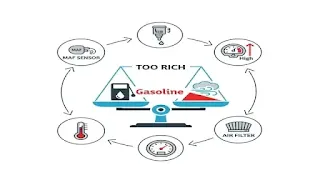✅ P0172 "System Too Rich" Code: Solved
Your Check Engine Light is on, and the code reader shows P0172 - System Too Rich (Bank 1). This code is the direct opposite of the "lean" code (P0171), and it signals a specific problem: your engine is getting too much fuel and not enough air.
Think of it as making coffee. A "rich" mixture is like using too much coffee grounds for the amount of water—it's overly strong and inefficient. This guide will help you diagnose why your car is running rich, starting with the simplest and most common causes.
🤔 Symptoms of a P0172 Rich Condition
An engine running rich will often give you clear warning signs beyond just the Check Engine Light:
A strong smell of unburnt gasoline from the exhaust pipe is the #1 classic symptom.
Black smoke coming from the exhaust, especially during acceleration.
 |
| Your guide to solving the P0172 rich code |
A significant and sudden drop in fuel economy (MPG).
The engine may feel sluggish, have a rough idle, or even stall.
🛠️ The Smart Diagnostic Path: Finding the Fuel Leak
Our mission is to find out why excess fuel is entering the combustion chamber. Here’s where to look, starting with the most likely culprits.
Step 1: SENSOR A Faulty Mass Airflow (MAF) Sensor
The MAF sensor is a primary suspect for both rich and lean codes. If it's dirty or failing, it might under-report the amount of air entering the engine. The computer, thinking there's less air, will still inject the programmed amount of fuel, creating a rich mixture.
Your Action: Cleaning the MAF sensor with a dedicated MAF sensor cleaner is an easy, inexpensive first step that often solves the problem. A faulty MAF may also trigger a [P0101 MAF sensor performance code].
Estimated Cost: $15 (for cleaner) to $250 (for a new sensor).
Step 2: 💧 Leaking Fuel Injectors
A fuel injector's job is to spray a fine, precise mist of fuel. When an injector's internal seal fails, it can leak or get stuck open, dripping raw fuel into the cylinder instead of spraying it.
Your Action: A mechanic can perform a "fuel injector balance test" to identify which injector is leaking. Sometimes, a professional fuel system cleaning can fix a sticky injector.
Estimated Cost: $150 (for cleaning) to $500+ (to replace a faulty injector).
Step 3: प्रेशर High Fuel Pressure
The fuel system is designed to operate within a specific pressure range. If the pressure is too high, the injectors will spray more fuel than the computer intends with every pulse.
The Cause: This is almost always caused by a faulty fuel pressure regulator. This small device is supposed to bleed off excess pressure and return it to the tank, but when it fails, pressure skyrockets.
Your Action: A simple fuel pressure test will immediately reveal if the pressure is out of spec.
Estimated Cost: $100 - $350 to replace the regulator.
Step 4: 🌡️ Faulty Engine Coolant Temp (ECT) Sensor
This small sensor tells the computer how hot the engine is. When you start a cold engine, the computer intentionally runs a "rich" mixture to help it warm up. If the ECT sensor fails and is stuck telling the computer the engine is always "cold" (even when it's hot), the computer will continuously command a rich mixture.
The Clue: Check your dashboard temperature gauge. Is it stuck on "Cold" or behaving erratically? This is a huge clue.
Your Action: This is a relatively cheap and easy sensor to replace.
Estimated Cost: $50 - $150.
Step 5: 💨 A Clogged Engine Air Filter
While less common, a severely clogged air filter can restrict airflow to the point that it physically chokes the engine, preventing enough air from getting in to match the fuel being injected.
Your Action: This is the easiest check of all. Simply inspect your engine air filter. If it's black and full of debris, replace it. It's a routine maintenance item that should be checked regularly.
The Clue: This issue is often linked to a noticeable loss of power, as the engine is literally struggling to breathe.
✨ Conclusion: Knowledge that Saves Fuel and Money
The P0172 "System Too Rich" code is a direct warning that your car is wasting fuel and potentially damaging expensive
components like the catalytic converter.
By systematically checking the sensors and fuel system components responsible for this imbalance, you can pinpoint the problem efficiently.
Fixing a rich condition isn't just about turning off a light; it's about restoring your engine's health and saving you money at the pump.
While this code deals with fuel inside the engine, other codes focus on fuel outside the engine.
A common issue is when the system meant to contain fuel vapors fails, often triggering a [P0442 small EVAP leak code], which is another puzzle worth solving for any car owner.

Leave a comment